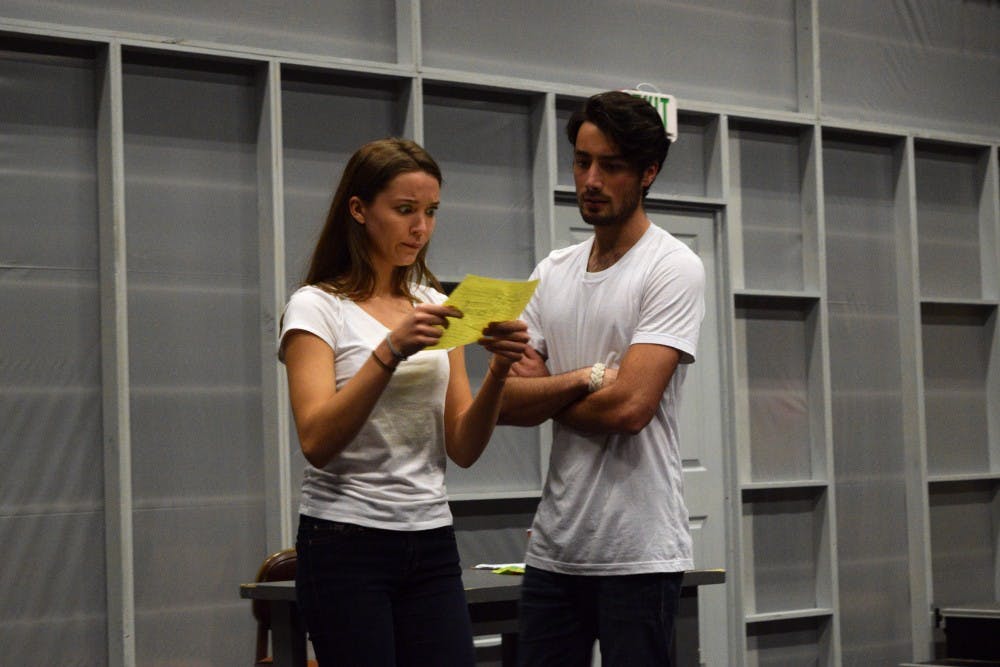This week, the Elon University community will have a chance to see an obscure play with a unique plot style when “The Memorandum,” written by Vaclav Havel, is performed as this year’s performing arts department fall production Oct. 6-12 in Roberts Studio Theatre in Scott Studios.
Havel, a native of what is now known as the Czech Republic, is widely known as a politician largely opposed to the communist domination in Czechoslovakia. When the nation became a democracy in 1989, Havel was the first elected president of the Czech Republic and maintained the presidency from 1993 to 2003.
“He’s a very interesting person,” said Kevin Otos, director and associate professor of theatre. “Frankly, they should write a play or opera about his life, because he spent time in prison as a political prisoner, wrote plays and — of course — was a politician.”
“The Memorandum” is Havel’s second play. The show was originally written in Czech, but Elon’s production is a version translated by Paul Wilson.

The play takes place in the office of an unnamed organization, whose director arrives one day at work to find his company has instituted a new language: Ptydepe. At that point, insanity ensues.
“As the play develops, we see all of the humorous craziness that trying to adopt this new official language creates in people as it makes their lives more and more difficult in funny ways, and also in not so funny ways,” Otos said.
The 17-student cast had an abnormal rehearsal period of only six weeks, compared to the typical 10 weeks. The time crunch presented the actors with the task of memorizing a complicated script much faster than normal.
“It’s a really wordy show,” said junior Austin Rae, who plays the show’s protagonist, Andrew Gross. “I didn’t expect how hard the memorization process for the show would be.”
Junior Emily Freeman, who plays the Ptydepe instructor, JV Brown, agreed.
“I have a six-page monologue,” she said. “Memorizing that was a challenge.”
It’s not the first one of its kind she’s faced at Elon, she added.
“Last semester, we did ‘The Glass Menagerie,’” Freeman said. “I played Amanda, and I was like, ‘Oh, I’ll never have to memorize this much again. Everything will be a breeze’— and then this show.”
Freeman said the acting program at Elon almost creates, “a bubble within the bubble,” and a feeling of family among the students in the program.
The acting majors are matched with mentors as freshmen. Rae said he and his mentor, senior Christian Frost, are very close, but this show will be the first time they get to act with each other.
“We play the protagonist and antagonist off of each other, so that’s been a joy to perform with him,” Rae said. “It’s a weird show, but it’s an awesome cast to perform with. To go out and do it, it’s been a really awesome and rewarding thing.”
The show is uncomfortably humorous at times, exhibiting relatable characters and scenarios. Freeman describes it as a combination of two very different notable works.
“People who like ‘1984’ will love it, or people who like ‘The Office,’” she said. “I know they’re so different, but this is really a blend of those two.”
With the show opening in a few short days, the actors are now completely off-book and feel more comfortable in their roles.
The show is stylistically unique, according to Otos, in that it is a realist play. As a result, it sometimes feels like a farcical comedy, borrowing elements of absurdist theater, a style that uses crazy examples to point out how ridiculous real-life situations are.
“Working in non-realistic styles is really good for actors and students of theater because it helps to foster the imagination, and that’s really useful to them later and now,” Otos said.
Because Havel was writing under a communist regime, his plays needed to be satirical to pass through censors.
“It could be a satire of any kind of workplace environment where people are making rules trying to make the organization better,” Otos said. “But the rules make some hardship that lead to some ridiculous outcomes.”
Freeman has seen parallels between “The Memorandum” and this election cycle.
“My theory is that the whole show is a commentary on government control — about how the government is so corrupt,” Freeman said. “And a lot of times, people don’t really know what they’re
doing.”


